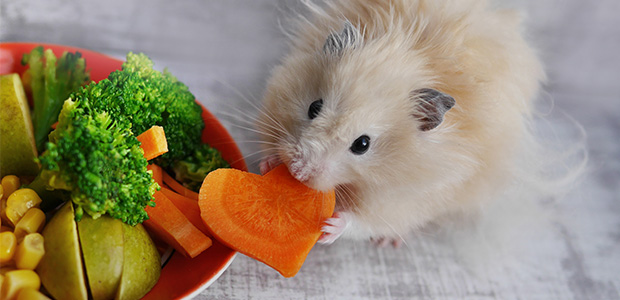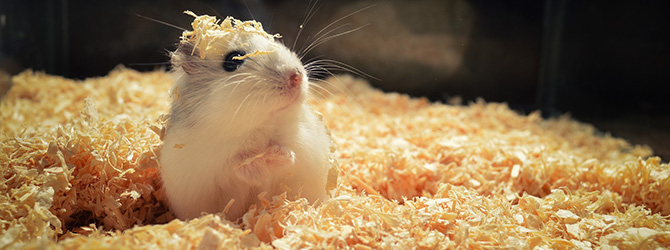Hamster diet guide: which foods can hamsters eat?
First Published: 18/11/2019
Last Updated: 31/10/2023
Feeding your hamster a well-balanced diet is a great way of keeping them healthy.
Let’s take a look at the dietary dos and don’ts for hamsters.
As with rabbit food, a domestic hamster’s diet should reflect the diet of a wild hamster. Wild hamsters are omnivores, meaning they eat fruits, plants and lovely protein-packed insects.
What does the ideal hamster diet look like?
A healthy diet for domestic hamsters will consist of 5 main food types:
- Feeding pellets, with a healthy blend of fibre and essential nutrients
- Fruit, veggies and herbs in small amounts
- Special hay that’s high in fibre (you’ll get this at most pet shops)
- High-protein snacks such as nuts or mealworms
- Clean, fresh water – made readily available throughout the day
Note: Avoid muesli-based diets. Hamsters will leave the fibrous parts and overindulge on sugar, which can lead to weight gain and dental problems.
Which fruits can hamsters eat?
Domestic hamsters can enjoy small amounts of:
- Grapes
- Strawberries
- Raspberries
- Cherries
- Apple
- Mango
Fruits are very high in sugar, so be sure not to overfeed your hamster. Fruit should be given in conjunction with high-fibre feeding pellets and other parts of their diet – never as a substitute.
Read more: Different types of hamsters: the ultimate guide.

Which vegetables can hamsters eat?
As with fruits, your hamster can tuck in to small amounts of:
- Carrot
- Broccoli
- Cabbage
- Cauliflower
- Peppers
- Courgette
- Kale
- Celery
Other snacks
Hamsters can eat certain fresh herbs, including basil, parsley and coriander.
To make sure they get plenty of protein, you can also treat your hamster to a few pieces of hard-boiled egg, some mealworms or nuts – just be aware that nuts have a high fat content, and are very easy to overfeed.
Read more: Hamster care guide: how to look after a hamster.
What NOT to feed your hamster
We know that muesli is best avoided, and that owners should be careful of overfeeding nuts, but what else should we keep out of our food-hoarding friends’ reach?
- Apple skins
- Fruit seeds or pips
- Garlic or onion
- Chocolate, or any other human treat
- Bread, or other products that contain yeast
Need more info?
For more help and advice on your hamster’s diet, or any other aspect of their health and wellbeing, contact your local vet today.
Find your nearest vet using our Find a Vet page, or speak to a vet online using Online Vets.
